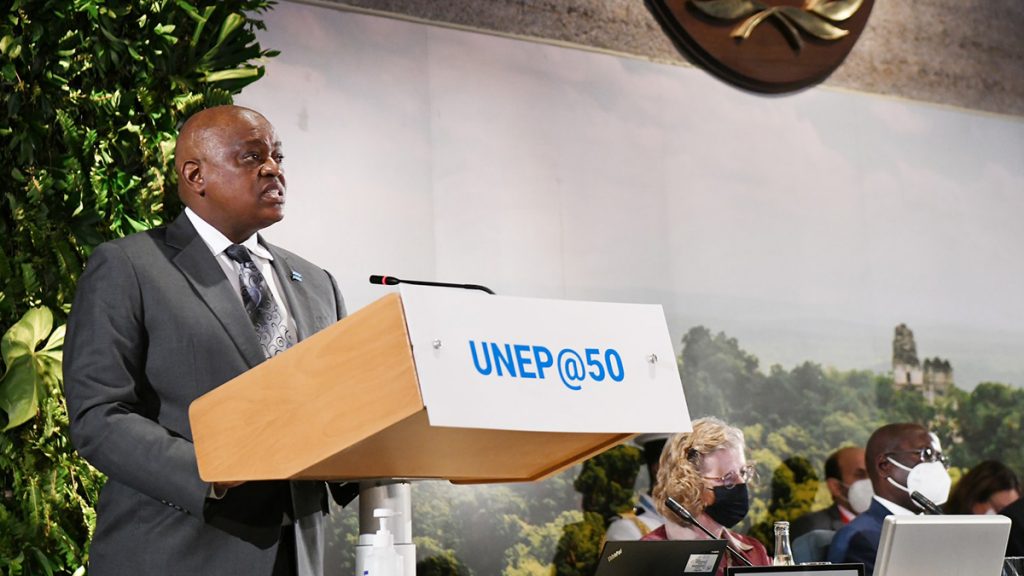MOKGWEETSI MASISI*
I wish to take this opportunity, to thank the Government of the Republic of Kenya for convening this Special Commemorative event and for inviting Botswana to be a part of the Fiftieth Anniversary celebrations of the United Nations Environment Programme (UNEP).
Kenya continues to provide exemplary leadership in the fields of sustainable development, environmental management, and climate change. On behalf of the people and Government of Botswana, I therefore wish to applaud His Excellency President Kenyatta for his visionary leadership and stewardship.
Not so long ago, the great tumults of COVID-19 that accompanied the commemorations of the 75th anniversary of the UN, served a spectrum of a dull moment, itself a useful reminder of how the promises to bequeath a safer planet to succeeding generations could be so encumbered within a blink of an eye. My delegation therefore welcomes the opportunity provided by this commemoration to reflect on our interactions with UNEP, and on the future we want.
Botswana applauds UNEP, its past and current leadership, for the impact the organisation has had on our environmental management agenda. The organisation remains a global authority on environmental matters. To this end, we welcome this commemoration as a moment to reflect on past achievements and to ponder on current challenges in
order to chart the way forward and strengthen this premier organization.
This commemoration comes at a time when the world is faced with multifaceted challenges that continue to militate against the achievement of sustainable development and the protection of our planet earth.
The stark reality is that the world is no longer what it was many years ago. The economic, environmental and social challenges of the 21st century are varied and quite profound, and have significantly altered the global sustainable development order.
Economic activity and population growth, particularly in the developing countries, have compounded the already enormous strain placed on the world’s natural resources and ecosystems. More specifically, the impacts of climate change, desertification, loss of biodiversity and growing levels of poverty are a painful reality of our times.
In view of these challenges, it is essential for us as global leaders to champion the balance between environment and development. To this end, UNEP provides a strong platform in terms of decision making as well as an effective reference point, which we must support in whatever way possible.
There are significant achievements that Botswana has realised within the sphere of environmental management. Botswana has updated and enacted new legislative and policy instruments to respond to the ever-evolving environmental challenges.
In order to contribute effectively to the global challenge to address climate change, we have strengthened and updated our Nationally Determined Contributions and developed the Climate Change Policy and the National Adaptation Plan. We pursued these policy developments in line with the National Transformation Agenda, where we are focused on transforming the general socio-economic and environmental status of Botswana.
In keeping with our international obligations, Botswana has continued to ensure high standards in the sustainable management of biodiversity rich ecosystems such as the Okavango Delta now listed as a World Heritage Site and the Makgadikgadi Wetlands system.
We also continue to ensure that the abundant wildlife resources are protected and utilised sustainably. I am particularly proud to state that 40% of Botswana’s land is under protected area status.
As Botswana, we also take pride in having integrated environmental management into our National Development Planning process and in our National Vision 2036. These
are two key instruments that guide our development as a nation. Furthermore, a position has been taken to ensure that all national policy development processes integrate environmental management, as this is a cross-cutting issue.
At the local level, Botswana has Community Based Natural Resources Management Program. This is meant to enhance community livelihoods through sustainable use of the natural resource base that exists in their environs. Among this, is the sustainable use of wildlife resources to support community livelihoods.
My Government has also strengthened the National Environmental Fund, which is a funding mechanism that supports communities in implementing environment and development projects that can enhance livelihoods, build resilience, economic recovery and sustainability.
Botswana continues to walk in the path provided by multilateral environmental agreements that she is party to. However, with limited resources, fulfilling these commitments continues to remain a challenge, but we stand committed as Botswana.
I wish to appeal to the international community, green philanthropists, private sector, research institutions and development agencies among others, to prioritise incentivising success in conservation.
Nations that have succeeded in conservation, especially of critical global goods such as red listed species, should be supported and not punished for their success stories through stringent global regulatory measures that deter sustainable utilisation and trade in wildlife resources among others.
Let me reaffirm Botswana’s commitment to multilateralism and to the collective interests of the global community as espoused in the Sustainable Development Goals. Together, as nations, through collaborations and partnerships, we can realise the future we aspire for, and UNEP remains a valuable leader to connect us with this future.
*PRESIDENT OF BOTSWANA, addressing THE 50TH ANNIVERSARY OF THE UNITED NATIONS ENVIRONMENT PROGRAMME in NAIROBI, KENYA.
